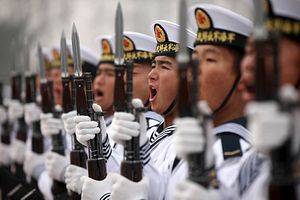Building on my recent post on the myth of Chinese counter-intervention (“The One Article to Read on Chinese Naval Strategy in 2015”), I would like to make a larger point about the overall difficulty of trying to ascertain how future conflicts will be fought. The doyen of military history, Sir Michael Howard, once compared figuring out the precise shape of the next war to a ship being trapped in a “fog of peace,” which, as a consequence, has to navigate by dead reckoning:
You have the terra firma of the last war and are extrapolating from the experiences of that war. The greater the distance from the last war, the greater become the chances of error in this extrapolation….For the most part you have to sail on in a fog of peace until at the last moment. Then, probably when it is too late, the clouds lift and there is land immediately ahead….Then you find out…whether your calculations have been right or not.
In that sense, we should never forget that most of defense analysis, beyond the technical level, is often a guessing game. War alone can test how well a military force and its weapons will perform on the battlefield. Naval warfare analysis is especially problematic since we have very few cases of actual combat (e.g., the Falkland War) to draw lessons from in the last couple of decades. In turn, historical lessons themselves, however, are often problematic and can prohibit intelligence services from adequately assessing an opponents strengths due to past-induced cognitive biases. Of course, we can always draw certain conclusions based on our assessment of the size, equipment, training, morale, leadership and logistical support bases of a force, yet all of this is subject to the dialectical nature of war and relative to who the adversary is, and in what domain the enemy will be engaged.
In the run-up to the Second World War, the French and British governments persistently overestimated the fighting strengths of the Czech, Polish, and Italian armies. In addition, the French and British were deeply worried about the perceived growing strengths of the Italian navy. The result was that these overestimations had a detrimental impact on both the formulation of policy and military strategy. Part of this was due to the wrong use of historical analogies, the misinterpretation of military culture, and a dogmatic military class of officers in both France and Great Britain scared by their experience of the First World War.
The cultural factor is one to especially keep in mind. In today’s tech-crazed world, where many of us see technological solutions (e.g., disruptive technologies) as a panacea to just about anything, defense analysts have a tendency to overestimate the impact of technological changes and new innovations on warfare. The debate over China’s anti-access/anti-denial (A2/AD) weapons arsenal (e.g., DF-21D and YJ-82 missiles, Houbei/Type-22 missile boats, Yuan-class submarines etc.) is a good case in point. The obsession over size and technical capabilities of the Chinese People’s Liberation Army (and Navy) often clouds our thinking on Chinese operational concepts and strategic thought.
However, a new technology alone, without new operational concepts and new organizational structures, will not be able to fundamentally influence the outcome of a future military confrontation. We therefore should start paying a bit more attention to factors besides new weapons and the acquisition thereof in order to improve our understanding of the true nature of the military competition with the People’s Republic of China and other states. For, as the Chief of Staff of the German Reichswehr, Generaloberst Hans von Seeckt, soberly assessed during the inter-war years: “Against a technical means of attack, the same technical concept has always found a defense.”
































